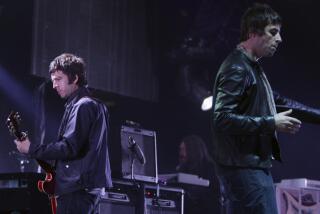Ticketmaster IPO Set at $14.50 a Share
- Share via
Ticketmaster Corp. going public today, but for billionaire Paul Allen, who bought 80% of the company three years ago, it may not be time for celebration.
The Los Angeles-based company, which dominates the handling of ticket sales for sports, concerts and other events at major arenas across the country, is selling 7.25 million shares for $14.50 each, a little above the $13.93-per-share price Allen paid for his 80% stake in the company three years ago.
If Allen had kept his money in Microsoft, the company he and Bill Gates co-founded and in which the bulk of his $8 billion or so in wealth remains, he would have more than tripled his money.
If the selling price appears low based on what Allen paid for his share of the company, many analysts who have looked at the deal think it’s still expensive considering that the company has lost money for the last two years.
“We thought it was too pricey to recommend,” said Ryan Jacob, research director at IPO Value Monitor, a newsletter that tracks initial public offerings. Although Ticketmaster has strong cash flow, Jacob said, “You have to be a rock-solid growth company” to justify such a high stock price.
Nevertheless, sources said the offering was oversubscribed. The stock will begin trading today on Nasdaq.
How much value has Ticketmaster added since Allen’s purchase? It depends on how you make the calculation. The offering puts Ticketmaster’s current capitalization at $327 million, which is less than the $337 million at which the company was valued when Allen made his acquisition.
But the company’s fully diluted value or “enterprise value” is about $570 million. That takes into account unexercised stock options (fully diluted there are about 30 million shares outstanding) and debt ($138.4 million) that would have to be paid if the company were to be acquired.
Allen’s share of Ticketmaster will fall to 54% after the offering, or 45% on a fully diluted basis, although Allen will retain control of the board.
Ticketmaster, which earned $8.6 million the year before Allen acquired the company, lost $6.6 million in the year ended Jan. 31.
Such numbers are heartening to competitors, who have had trouble cracking Ticketmaster’s hold on the ticketing business.
“They don’t look so invincible anymore,” said Larry Schwartz, chief executive of Entertainment Express, a Guildford, Conn., company that sells ticketing software and services in competition with Ticketmaster. “It’s like the Emperor’s clothes. You get a look and you think, ‘that’s it?’ ”
Weak concert attendance as well as baseball and hockey strikes depressed Ticketmaster’s earnings last year. Critics say Ticketmaster’s high charge for handling tickets has contributed to poor concert attendance. Ticketmaster charges $1 to $7 in “convenience” charges for every ticket it sells. Combined with the handling charge, it earns an average of $3.50 per ticket, according to the prospectus.
Heavy start-up costs for “Live Magazine,” a monthly entertainment magazine Ticketmaster launched in February, also depressed earnings.
Ticketmaster has been in a quiet period during which its officers are prohibited by securities’ laws from speaking with the media. Its prospectus, however, argues that management has shown itself capable of maintaining a high rate of growth with revenue increasing at a compounded growth rate of 20% a year from 1991 to 1996, in spite of the downturn last year.
Ticketmaster Chief Executive Frederic Rosen, who built up the company for the Pritzker family, earned $6.53 million in salary and bonuses during the last two years. The prospectus also reveals that as a part of Allen’s buyout deal in 1993, Rosen received $6.3 million in cash and 306,208 shares in Ticketmaster.
Rosen has an option to buy an additional 998,505 at $14.14 a share. If exercised, those shares would give him a 5.5% share of Ticketmaster after the offering.
Analysts say the IPO price in part reflects the unquantifiable value of Ticketmaster’s significant franchise. The company plans to extend that franchise into such new venues as zoos, museums, amusement parks and ski resorts, as well as into overseas markets.
A primary drag on the company’s earnings has been its $183.6-million debt. The company’s net interest expense was $12.8 million last year.
The company plans to improve its earnings by using the proceeds from the stock offering to reduce its debt to $138.4 million. Analysts say that level still leaves the company heavily leveraged.
The company’s high debt levels are a legacy of the way in which Allen originally structured his acquisition. In a complex arrangement, Ticketmaster essentially borrowed $266 million to pay the Pritzkers for an 80% stake in the company. Allen then paid the company $173 million for that stake, leaving the other $93-million debt on the company’s books.
The debt grew further as Ticketmaster began buying up minority shares in its subsidiary operations across the United States and overseas in an effort to simplify its balance sheet.
In the meantime, the company is a long way from fulfilling Allen’s dream of becoming a major power in cyber-commerce. Although the company will make all tickets for its events available online by April, it doesn’t expect such sales to account for a significant portion of its revenue any time soon.


